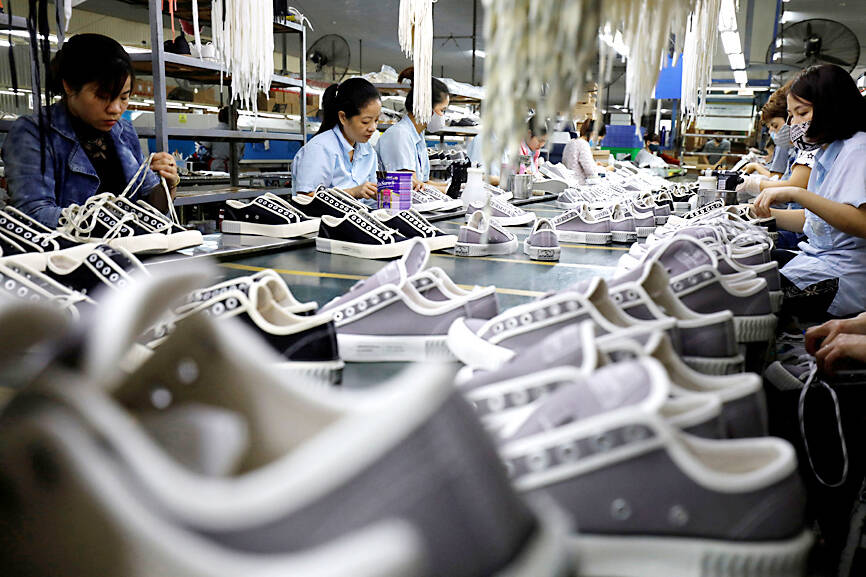Vietnam is vulnerable to becoming the incoming US administration’s next target for tariffs as data show its trade surplus with the US ballooning, industry executives and analysts said.
The communist-run country, home to large industrial operations of US multinationals such as Apple Inc, Google, Nike Inc and Intel Corp, has the fourth-highest commercial surplus with the US, topped only by China, the EU and Mexico.
US trade data released on Thursday showed the country’s deficit with Vietnam reached US$102 billion in the first 10 months of this year, nearly a 20 percent increase over the same period last year.

Photo: Reuters
“For [US president-elect Donald] Trump the main metric is the trade deficit, and the Vietnam number is bad,” said Deborah Elms, head of trade policy at the Asia-based Hinrich Foundation.
“Vietnam is an ideal candidate for early action because it cannot easily retaliate,” she said.
Trump, who is to take office next month, threatened tariffs of up to 20 percent on all US imports during his election campaign.
His son Eric Trump, a top adviser, has cited Vietnam among countries that “ripped off” the US, according to a video shown last week at a business conference in Hanoi organized by the American Chamber of Commerce in Hanoi.
At the event several businesspeople and trade association representatives expressed concern about possible tariffs on Vietnam.
“The new tariffs are one of the biggest concerns for the [South] Korean industry in Vietnam,” Hong Sun, head of South Korea’s chamber of commerce in Vietnam, told the conference.
South Korea’s Samsung Electronics Co is a major exporter of smartphones and other electronic devices to the US from Vietnam
Vietnam’s Ministry of Foreign Affairs did not reply to a request for comment on potential tariffs, but Vietnamese officials have repeatedly urged Washington to maintain seamless trade.
In another sign Vietnam could face tariffs, Donald Trump picked Peter Navarro to be his senior counselor for trade and manufacturing.
Navarro has said tariffs on Vietnam would be highly effective in cutting the US trade deficit, writing in the Project 2025 proposals seen by many policymakers in Washington as a blueprint for the incoming Donald Trump administration.
“Navarro has been a well-known expert under the [Donald] Trump administration for increasing the size of the American manufacturing sector, imposing high tariffs, and repatriating global supply chains,” said Nguyen Hung, a specialist in supply chains at RMIT University Vietnam.
Vietnam benefited from trade barriers Donald Trump imposed on Beijing in his first term, which spurred manufacturers to shift production out of China.
With nearly one-third of Vietnam’s exports now going to the US, the country would need to improve the traceability of goods and components to dispel concerns of being used merely as an assembling site for products made in China, Hung said.
The country could partly offset its large trade surplus by boosting its imports from the US, including possibly liquefied natural gas, drugs and airplanes, officials have said.
However, it is unclear whether Vietnamese authorities support these offsetting measures and how significant they could be.
“I don’t think Vietnam is in a position to buy quickly and enough” to materially reduce its surplus, Elms said.

Intel Corp chief executive officer Lip-Bu Tan (陳立武) is expected to meet with Taiwanese suppliers next month in conjunction with the opening of the Computex Taipei trade show, supply chain sources said on Monday. The visit, the first for Tan to Taiwan since assuming his new post last month, would be aimed at enhancing Intel’s ties with suppliers in Taiwan as he attempts to help turn around the struggling US chipmaker, the sources said. Tan is to hold a banquet to celebrate Intel’s 40-year presence in Taiwan before Computex opens on May 20 and invite dozens of Taiwanese suppliers to exchange views

Application-specific integrated circuit designer Faraday Technology Corp (智原) yesterday said that although revenue this quarter would decline 30 percent from last quarter, it retained its full-year forecast of revenue growth of 100 percent. The company attributed the quarterly drop to a slowdown in customers’ production of chips using Faraday’s advanced packaging technology. The company is still confident about its revenue growth this year, given its strong “design-win” — or the projects it won to help customers design their chips, Faraday president Steve Wang (王國雍) told an online earnings conference. “The design-win this year is better than we expected. We believe we will win

Power supply and electronic components maker Delta Electronics Inc (台達電) yesterday said it plans to ship its new 1 megawatt charging systems for electric trucks and buses in the first half of next year at the earliest. The new charging piles, which deliver up to 1 megawatt of charging power, are designed for heavy-duty electric vehicles, and support a maximum current of 1,500 amperes and output of 1,250 volts, Delta said in a news release. “If everything goes smoothly, we could begin shipping those new charging systems as early as in the first half of next year,” a company official said. The new

Quanta Computer Inc (廣達) chairman Barry Lam (林百里) is expected to share his views about the artificial intelligence (AI) industry’s prospects during his speech at the company’s 37th anniversary ceremony, as AI servers have become a new growth engine for the equipment manufacturing service provider. Lam’s speech is much anticipated, as Quanta has risen as one of the world’s major AI server suppliers. The company reported a 30 percent year-on-year growth in consolidated revenue to NT$1.41 trillion (US$43.35 billion) last year, thanks to fast-growing demand for servers, especially those with AI capabilities. The company told investors in November last year that